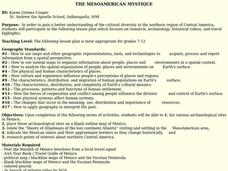Curated OER
The Dawn of Humanity
Students investigate recent archaeological challenges to theories of human origins. They research the history and geography of various African regions to create proposals for future excavations.
Curated OER
Marine Archaeology
Students examine marine archaeology. In this archaeological data lesson, students see how archaeologists use data to make inferences about shipwrecks. Students read data and make their own inferences, write about marine life and...
NIOS Download
The Harappan Civilization
The Harappan Civilization, also known as the Indus Valley civilization (2600 BC-1900 BC), is the focus of a resource packet that details the rise and fall of a culture that existed in India during the Chalcolithic period of history.
Curated OER
Petroglyphs: Protecting the Past
Fourth graders investigate the three types of rocks and study about petroglyphs. They explore why petroglyphs were used by the Nez Perce People. Students investigate the properties of the three types of rocks and they discuss cultural...
Curated OER
Mexican-American Life in Texas
Sixth graders examine the development of cotton farms in Texas and the use of Mexican-Americans as a labor force. They examine pictures of life on cotton farms and draw pictures of themselves performing one of their own daily chores. ...
Curated OER
The Archaeology of Cactus Ruin
Students simulate archaeologists by excavating a paper site. In groups, they use a sampling strategy to determine information about the people who lived at the site.
Curated OER
THE MESOAMERICAN MYSTIQUE
Students research, archeology, historical videos, and travel highlights in the northern region of Central America. They identify the various archaeological / historical sites along with a date of probable existence and the title of the...
Curated OER
"You Shall Do Your Best Endeavor" - Working With Primary Documents
Students read and interpret primary source documents regarding historic Jamestown. In small groups, they read the primary documents, answer questions, and view online maps of Jamestown Island and Virginia.
Curated OER
Gridding a 2 x 2 Meter Unit
Middle schoolers use the internet to examine what happens at an archeological dig site. In groups, they practice measuring a 2x2 meter square unit and gridding it out as an archeologist would do. They review the possible solutions at the...
Curated OER
2 x 2
Students work together to grid a 2 x 2 meter unit using the formula for the Pythagorean Theorem. After creating the grid, they identify the location of artifacts and create a map of their location. They develop a graph and table of their...
Ocean Explorer
Looking for Clues
Upper graders become "shipwreck detectives" by studying the debris field from a shipwreck in the Aegean Sea which took place in the 700s. A website is accessed that gives specific information about the debris field, and pairs of...
Mississippi Department of Archives and History
Protesting Violence without Violence
The ultimate legacy of Emmett Till's violent death is its role in the non-violent roots of the Civil Rights Movement. A lesson compares contemporaneous articles with the lyrics of Bob Dylan's "The Death of Emmett Till" and prompts...
Curated OER
The Mesoamerican Mystique
Students gain a better understanding of the cultural diversity in the northern region of Central America. They engage in a instructional activity which focuses on research, archaeology, historical videos, and travel highlights.
Curated OER
Effigy Mound Activity
Students research effigy mounds of Native people in Wisconsin. They create large models of effigy mounds in a given area based on factual information from their studies and research.
Curated OER
Past v. Present: Using Geography & Anthropology
Learners examine artifacts and documents from their Canadian community. They analyze early Canadian history and make predictions about the future of the country.
Curated OER
Contextual Clues
Students observe and interpret images of artifacts in different contexts in order to recognize importance of leaving artifacts in original context to correctly understand their meaning, and observe what is surrounding object to interpret...
Curated OER
Archaeology In The News
Students investigate the different articles of archaeology that is found in a variety of research and news resources. They read one of the selections and complete the worksheet as a guide to writing a summary of the article. Students...
Curated OER
Life of a Mission - From Beginning to Now
Students research the history of a Spanish mission. They create a timeline showing the major events of the mission. They complete a worksheet to end the instructional activity.
Curated OER
Easter Island
Fifth graders describe the location and physical environment of Easter Island. This description include: identification of the closet continent to Easter Island, ocean in which Easter Island is located, and some geographical features of...
Curated OER
Looking for Clues
Young scholars infer the cause of a shipwreck based upon information about artifacts found in the wreck. In this marine archeology lesson plan, students use an inventory list to infer the cause of a shipwreck. Young scholars discuss the...
Curated OER
Refugees
Sixth graders use the internet as well as personal interviews to research refugees and refugee status from a Canadian and international perspective.






















